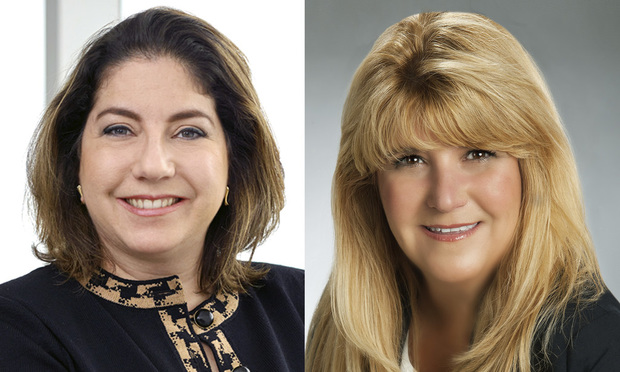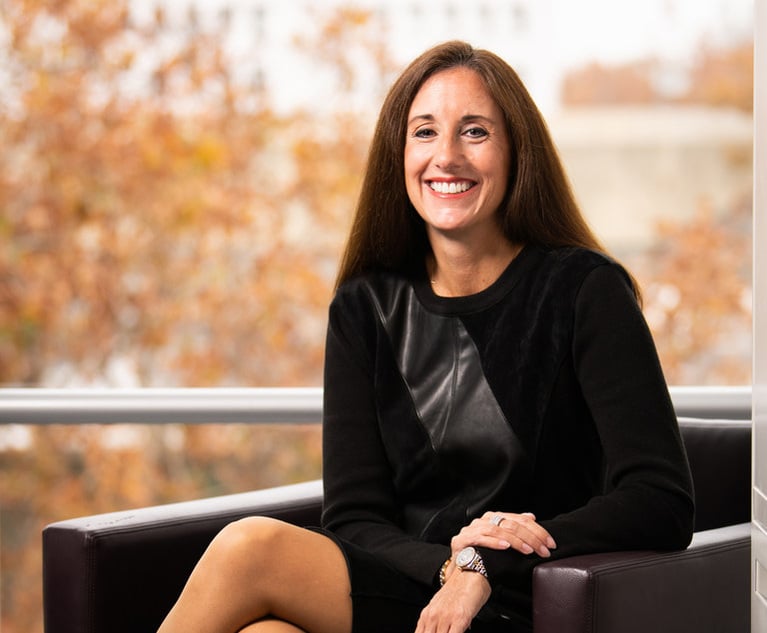How They Stack Up: South Florida Voluntary Bar Associations
South Florida voluntary bar groups are led in assets and revenue by the Palm Beach, Dade and Broward County bar associations.
June 18, 2019 at 01:07 PM
6 minute read
 Stephanie Carman, counsel with Hogan Lovells in Miami, left, and Edwina Kessler, partner with Catri, Holton, Kessler & Kessler in Fort Lauderdale, right. Courtesy photos
Stephanie Carman, counsel with Hogan Lovells in Miami, left, and Edwina Kessler, partner with Catri, Holton, Kessler & Kessler in Fort Lauderdale, right. Courtesy photos
While the American Bar Association has a long-term plan to stem declining membership and Florida Bar membership is mandatory, many affinity bars in South Florida have grown accustomed to expansion.
An analysis of IRS filings by South Florida bar associations shows the region is led by the big three: the Palm Beach, Dade and Broward county bar associations in that order based on both assets and annual revenue.
In assets, Palm Beach led with $2.76 million followed by Dade at $1.23 million and Broward at $1.1 million. Palm Beach was flat year over year, Dade was down 10 percent and Broward down 4 percent.
Membership trends reported by the associations have been mixed. It stood at about 3,200 last year for the Dade County bar, down from about 3,500 five years ago. The Broward association has seen steady growth to 3,426 from 2,941 five years ago. The Palm Beach bar has hovered about 2,900 for five years.
A second tier of voluntary bar associations with a much smaller asset base groups the Bankruptcy Bar Association of the Southern District of Florida, the South Florida chapter of the Federal Bar Association, the MIami-Dade chapter of the Florida Association for Women Lawyers and the Cuban American Bar Association. Their assets range from $243,941 for the bankruptcy bar to $74,825 for CABA.
Finances are backed primarily by dues, program fees, donations from law firms and other sponsors, and lawyer referral service fees. Expenses cover staff, programs and special projects, often coordinating and supporting pro bono work.
Attorneys are attracted to join voluntary bar groups by the opportunity for networking and potential client referrals, face time with judges, mentoring and leadership training for those so inclined.
“Our greatest strength as the local county bar is connecting people locally, and there's no stronger tool out there in anyone's tool belt,” said Braulio Rosa, executive director of the Broward County Bar Association for six years. “If you're practicing law here, we're the group that helps you connect.”
The Palm Beach county bar leads all by assets at $2.67 million in its latest IRS filing.
“I wouldn't consider us rich by any means,” said the Palm Beach association president, Office Depot assistant general counsel Jessica Callow. “We do own our building. It's our biggest asset.”
The three largest groups own or co-own their headquarters. The real estate sits on the asset side, and the latest annual revenue reports totaled $1.52 million for Palm Beach, $1.25 million for Dade and $842,639 for Broward.
“Our primary revenue source is dues, and we also have CLE programs that we put on,” Callow said. “As much as possible, we do try to cover the bulk of that with sponsors, lawyers and nonlawyers.”
Exposure to judges is a key enticement offered by most voluntary bars.
Hogan Lovells counsel Stephanie Carman, president of the Dade association, said “the support has been phenomenal from the judges” at the federal and state appellate and circuit levels.
The Broward bar boasts close to full membership for judges, and its bench-bar conference attracts 500-600 attendees every two years. The association sold out a “Get Civility” event after more and more judges signed on, and it runs a monthly “judicial jaunt” luncheon where judges explain their procedures. “They've given a lot of insight into how to move things forward,” said president Edwina Kessler of Catri, Holton, Kessler & Kessler in Fort Lauderdale.
The Bankruptcy Bar Association hosts brown-bag lunches at bankruptcy courthouses on an alternating schedule with South Florida's seven judges and practitioners and is partnering with the Florida Bar for a view from the bankruptcy bench event in November. Membership stood at 287 members in 2018 and 339 on April 1 with 82 renewals pending.
Mentoring is often intergenerational and can be life-sustaining for the association. In one case, a judge in the Miami-Dade FAWL chapter mentored a scholarship recipient who went on to become one of the association's committee co-chairs.
“I feel like if you give the right people the opportunity, the whole organization will benefit from making those good decisions,” said chapter president Elisa D'Amico, a K&L Gates litigation partner. Membership has grown to 500 from 450 five years ago.
She credits “really, really rich programming” featuring, for example, seminars on trial skills, jury selection, branding and technology and a mission focused on diversity and inclusion. For the annual installation dinner, that meant a narrated video for visually impaired people.
The success of the organization translates to professional success for D'Amico. “Most of my referrals that don't come through clients come from Miami-Dade FAWL,” she said.
All of the bar associations have some form of pro bono project or coordinate attorney volunteers for legal aid groups.
Bankruptcy bar president Zach Shelomith of Leiderman Shelomith Alexander + Somodevilla in Fort Lauderdale said: “We try to educate our members on how to give back to the community. Bankruptcy is a natural avenue for them to do that.” The chapter's help with consumer bankruptcy cases has been recognized with two voluntary bar pro bono service awards by the chief justice of the Florida Supreme Court.
The ABA, the top of the heap for voluntary bars, has pushed to address the loss of about 56,000 dues-paying members in 10 years and responded with dues cuts starting next year to boost membership to a targeted 268,812 by 2024. Fiscal year 2018 membership was around 400,000.
Shelomith doesn't see the smaller bar associations dealing with the same big-umbrella issues as the ABA.
“The local bar associations are more valuable now than national,” he said. “Most of us have local practices, so having local bar associations that are strong really helps the local bar, the communities.”
This content has been archived. It is available through our partners, LexisNexis® and Bloomberg Law.
To view this content, please continue to their sites.
Not a Lexis Subscriber?
Subscribe Now
Not a Bloomberg Law Subscriber?
Subscribe Now
NOT FOR REPRINT
© 2025 ALM Global, LLC, All Rights Reserved. Request academic re-use from www.copyright.com. All other uses, submit a request to [email protected]. For more information visit Asset & Logo Licensing.
You Might Like
View All

EB-5 Rebounds After a Rocky Year: Challenges of 2024 Lay Groundwork for a Booming 2025

Are Counsel Ranks Getting 'Squeezed' as Nonequity and Associate Pay Grows?
5 minute readTrending Stories
Who Got The Work
J. Brugh Lower of Gibbons has entered an appearance for industrial equipment supplier Devco Corporation in a pending trademark infringement lawsuit. The suit, accusing the defendant of selling knock-off Graco products, was filed Dec. 18 in New Jersey District Court by Rivkin Radler on behalf of Graco Inc. and Graco Minnesota. The case, assigned to U.S. District Judge Zahid N. Quraishi, is 3:24-cv-11294, Graco Inc. et al v. Devco Corporation.
Who Got The Work
Rebecca Maller-Stein and Kent A. Yalowitz of Arnold & Porter Kaye Scholer have entered their appearances for Hanaco Venture Capital and its executives, Lior Prosor and David Frankel, in a pending securities lawsuit. The action, filed on Dec. 24 in New York Southern District Court by Zell, Aron & Co. on behalf of Goldeneye Advisors, accuses the defendants of negligently and fraudulently managing the plaintiff's $1 million investment. The case, assigned to U.S. District Judge Vernon S. Broderick, is 1:24-cv-09918, Goldeneye Advisors, LLC v. Hanaco Venture Capital, Ltd. et al.
Who Got The Work
Attorneys from A&O Shearman has stepped in as defense counsel for Toronto-Dominion Bank and other defendants in a pending securities class action. The suit, filed Dec. 11 in New York Southern District Court by Bleichmar Fonti & Auld, accuses the defendants of concealing the bank's 'pervasive' deficiencies in regards to its compliance with the Bank Secrecy Act and the quality of its anti-money laundering controls. The case, assigned to U.S. District Judge Arun Subramanian, is 1:24-cv-09445, Gonzalez v. The Toronto-Dominion Bank et al.
Who Got The Work
Crown Castle International, a Pennsylvania company providing shared communications infrastructure, has turned to Luke D. Wolf of Gordon Rees Scully Mansukhani to fend off a pending breach-of-contract lawsuit. The court action, filed Nov. 25 in Michigan Eastern District Court by Hooper Hathaway PC on behalf of The Town Residences LLC, accuses Crown Castle of failing to transfer approximately $30,000 in utility payments from T-Mobile in breach of a roof-top lease and assignment agreement. The case, assigned to U.S. District Judge Susan K. Declercq, is 2:24-cv-13131, The Town Residences LLC v. T-Mobile US, Inc. et al.
Who Got The Work
Wilfred P. Coronato and Daniel M. Schwartz of McCarter & English have stepped in as defense counsel to Electrolux Home Products Inc. in a pending product liability lawsuit. The court action, filed Nov. 26 in New York Eastern District Court by Poulos Lopiccolo PC and Nagel Rice LLP on behalf of David Stern, alleges that the defendant's refrigerators’ drawers and shelving repeatedly break and fall apart within months after purchase. The case, assigned to U.S. District Judge Joan M. Azrack, is 2:24-cv-08204, Stern v. Electrolux Home Products, Inc.
Featured Firms
Law Offices of Gary Martin Hays & Associates, P.C.
(470) 294-1674
Law Offices of Mark E. Salomone
(857) 444-6468
Smith & Hassler
(713) 739-1250







